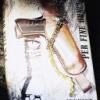I've been reading this thread with a mixture of fascination and horror. Fascination because there have been many extremely articulate insights into Fleming's Bond, one of my favourite subjects; horror because two of my favourite posters to this forum are on opposite sides of the debate and things are getting, well, not nasty, exactly, but... slightly touchy.
While I don't intend to play Solomon, a few thoughts do strike me and I hope they'll be at least insightful, even if not helpful. First of all, I haven't read Moore's BLACK DOSSIER yet. That means my opinion on it counts for very little. Obvious, no? Well, not when applied to Fleming's Bond, apparently! I've no idea if Alan Moore has read all of Fleming's work, but let's imagine for a moment that he hasn't. Does that matter, if he's trying to paint a portrait of Fleming's Bond? Well, yes and no, I think. If he were professing a straightforward critical opinion, yes: I wouldn't much trust the opinion of someone about a character if they hadn't read the canon: that's the bare minimum. But deconstruction, parody, pastiche, reimagining, caricature... all these take notable elements of something and make them more extreme, and sometimes that doesn't mean looking at every single photograph of a subject and taking it all into account, but taking the one paparazzi photo they're most famous for. Sometimes it's unfair. In a way, that can be part of the point. And sometimes, an imaginative artist ignorant of the full picture can create a shard of truth.
I agree that Ian Fleming's reputation is sadly not what it could be. In fact, as I've said many times before, I think most criticism of his work has misunderstood his strengths, and the whole flow of it has missed some pretty crucial points. The arrogance of people on the internet!, but I think even the most jaundiced eye would have to admit that there's more astute observation and understanding of Ian Fleming's work in this thread than there is in the newspaper article linked to, and indeed in most newspaper articles.
Of all the critics, Kingsley Amis understood Ian Fleming best, to my mind, but he was still just as lazy as we're hypothetically presuming Alan Moore to be, evidently so from his own DOSSIER. I think he took some very strong positions
backing Fleming based on rather scant knowledge. Did he read every other thriller writer who came before Fleming to put him into proper context in the genre? Of course he didn't - it wasn't that sort of book, and that's an impossible task anyway. 'Oh, not that sort of book, eh? Easy way out, that!' Fleming didn't write in a vacuum, and if you're going to claim, as Amis did, that he was one of the greats in the genre, surely you need to be well versed enough in it to convincingly make that case. Was he, or was he comparing him to Verne because that was someone great who he'd read and had noticed similarities to? How much should he have read of the genre for his views to have been valid? Or could he just
know that Fleming was one of the greatest thriller writers of all time, highly innovative and a far superior writer to... those others he hadn't really read much but who weren't rated? That's the same error he was bemoaning had been made of Fleming, pretty much: written off without a close reading. I don't think there are yeses or nos here, by the way. There is truth in Amis' criticism of Fleming, but it's certainly not the whole truth... and we all know that doesn't exist anyway, especially not in something as subjective as art.
I think Ian Fleming's worth as a writer has been completely skewed by the success of the films. I think his innovations were not the ones usually ascribed to him. And I think Bond is a fascinating character... and no character at all. Revelator, you wrote on this site in 2006:
'The books are freakish because in many ways they're failures as thrillers: they feature a hero who can't decide whether he's a blunt government instrument or a modern-day St.George (and who can't decide whether he's a cold exploiter of women or a big softie who takes in birds with broken wings).'
I'm taking you out of context, surprising you with a quote from two and a half years ago that you may no longer agree with. I no longer agree with a good portion of what I've written on this site. But I do (I think) agree with your 2006 self. Sometimes, I wonder if Bond is one character, really. If you think of Conan Doyle's Sherlock Holmes, there's a very definite character who springs to mind, with very definite characteristics. But Bond is a bit of a hodge-podge. I think in some ways he's rather a weak and inconsistent character, but Fleming was great for other reasons, and sometimes those inconsistencies worked to his advantage. I think once you've read all of his published novels and short stories (which several people on this thread appear not to have done!), you become rather affectionate towards him, and perhaps precisely because you've heard all that crap about him being a misogynistic psychopath for so long, his softer side becomes a little more obvious. Caricaturists don't see the best side of people, though. Caricature, deconstruction, Moore's sort of game, is by nature unfair, and doesn't allow comebacks. Just as Amis didn't, batting down the critics from his side of the wall. But Kingsley, I feel like sputtering, everything you've claimed to be unique in that passage is also found in Leslie Charteris, no? But Kingsley's not there to reply, and I'm left talking to myself. Nobody shares our views completely. We are all, ultimately, alone.

I think we could also address the issue that many of the myths Moore has latched onto have been and continue to be perpetuated by Bond fans. By Bond fans who haven't read all of Fleming, but insist on one reading of CASINO ROYALE that
actually, in the books, you know, he's a ruthless cold-blooded assassin. Yes, so ruthless that he refuses to assassinate a target because he rather likes the look of her... almost has fallen in love with her on sight! So cold-blooded that we are explicity told that he has never killed in cold blood (FROM RUSSIA WITH LOVE) - directly contradicting CASINO ROYALE! (An interesting Moore-esque way of looking at that, rather than an obvious inconsistency from Fleming, would be the idea that FRWL is true and CR false, ergo he was lying to both Vesper and Mathis, which begs the question why, and so on).
The cold exploiter of women and the rather sentimental man who can't resist a bird with a wing down co-exist in Fleming's books. We're complex creatures, we humans, but in Bond's case he sometimes seems to me to be unformed, or the author indecisive about his form, or he takes different forms but the background and style are similar enough that we accept it is he. In fact, as long as he's called 'James Bond', we accept an awful lot. Moore, perhaps on scant reading, has, I take it (I'm guilty of the sin I'm castigating!), gone for the cold exploiter. Revelator would rather a more rounded picture that includes the sentimental side, among other aspects. Not an especially interesting caricature or deconstruction or anything else, I expect, but yes, perhaps possible. Perhaps more interesting would be to depict the cold hard Bond as a great big softie who keeps falling for these women and getting his

rescued by them at the last moment, as happens at the end of Fleming's THUNDERBALL. Perhaps a more accurate deconstruction would be a James Bond who is cold and ruthless one minute, and then two scenes later, to suit the plot, becomes an almost totally different character, noble and good and sensitive, only to remember a few moments later that he's meant to be ruthless and suddenly switch back again. But nobody would get the joke. If you draw a caricature of someone and nobody realises who it's meant to be, it's simply not a very good caricature.
And I think the cold exploiter of women, the misogyny if not the fascism, was certainly felt in Fleming's work at the time. There are the infamous reviews, yes, but there's also this from Michael S Howard's book JONATHAN CAPE: PUBLISHER, discussing the publication of CASINO ROYALE:
'Ian... went busily to work, devising headlines for the chapters and ideas for the jacket. To discuss these we met towards the end of that October, for the first time since the Popski dinner, and I enjoyed his enthuasistic interest in technicalities of production. I did not tell him that the book itself had repelled me, and caused me sleepless nights. It had troubled me to be associated with its publication, for I thought its cynical brutality, unrelieved by humour, revealed a sadistic fantasy which was deeply shocking; and that the book would do discredit to the list.'
I don't think this is entirely a misreading. I think there is something in that first novel that
is a little unpleasant, even if a cursory reading of any Dennis Wheatley novel will immediately banish the notion.

I've not read BLACK DOSSIER, but I've known about it since March 2004, when I interviewed Alan Moore over the phone for an hour or so and he spent much of it discussing this project - then swore me to secrecy, meaning I couldn't reveal it in my article! A counter-look at Bond, Kim Philby, Graham Greene and Harry Lime... Five years ago this week, when I had
not read all of Ian Fleming's work, the idea seemed right up my street, and I eagerly lapped up every word Moore told me about it. Yes, yes, yes, how wonderful. Now, well, yes... the idea doesn't seem so innovative, perhaps.
We're all, myself included, getting rather po-faced about a bunch of books. But, if we want to continue in that strain for just a moment, such depictions of James Bond will continue for a while to come unless James Bond fans do something about it.

It's time to stop ascribing to Ian Fleming's work anything we fancy that sounds cool, from having read bits and pieces. If we reduce his work to inaccurate soundbites - to caricatures - can we be surprised that others do, too? It's time, I think, to reassess what Ian Fleming's books
really were, and who James Bond was in them. For some of us, that means reading all the novels and short stories (minimum requirement, sorry!), and then considering them a bit harder than has been done before. From that, perhaps something a little more accurate and less reductive will spring forth, and it will be another character's turn to be deconstructed, while new editions of Fleming novels sprout up in every train station bookshop.
And I shall now cut this baby in half.





